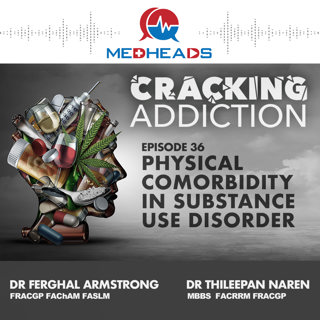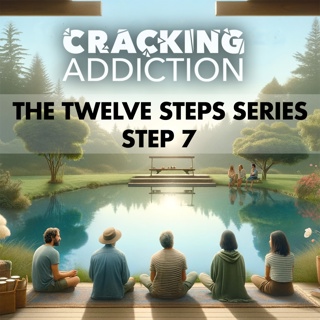
Exploring Step 7 : The Active Process of Humble Self-Reflection
In today's episode, Dr. Ferghal Armstrong and Dr. Laura Petracek delve into the seventh step of the twelve-step program. They discuss the importance of humbly asking God to remove our character defects and how it is a continuous process rather than a one-time request. They explore the concept of progress, not perfection, and the active role we play in our personal growth. They also address the secular context of the seventh step, explaining that it can be reinterpreted to seek help from oneself, the community, therapists, or support groups. Discover how therapy can complement a twelve-step program and the importance of self-awareness in the journey of recovery
13 Dec 202314min
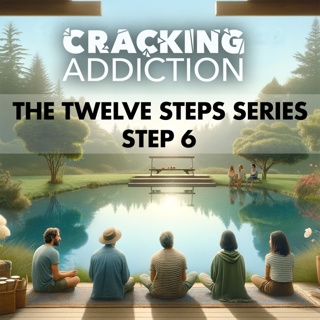
The 6th Step: Surrendering to Change and Seeking Transformation in Addiction Recovery
Dr. Ferghal Armstrong and Dr. Laura Petracek discuss the 6th step of the twelve-step process of addiction recovery. They explore the concept of God in this step and emphasize that it can be interpreted as a higher power or even nature. They also question the passive nature of this step, as it involves asking an external force to remove our character defects. The discussion delves into the Christian origins of the steps and how they may not resonate with everyone. Ultimately, Dr. Petracek suggests rewording the step to focus on being willing to acknowledge and actively work on our faults and shortcomings.Key Points:1. The 6th step originally had a Christian foundation but can be personalized to a higher power of choice.2. Asking God or a higher power to remove defects of character may absolve individuals of personal responsibility for change.3. Motivational interviewing can help individuals identify obstacles to change and improve readiness.4. Sponsors play a crucial role in guiding individuals through the steps, but may not have psychological training.5. The phrase "we are entirely ready" implies a commitment to change without holding back or making exceptions.6. Modern psychological tools like CBT and motivational interviewing can complement the twelve-step process.7. The reworded 6th step focuses on acknowledging and actively working on faults and shortcomings, providing a more accessible approach.8. Accountability and agency are emphasized in the reworded step, promoting personal responsibility for change.9. The process after the 5th step involves a simple prayer expressing readiness for defects to be removed.10. The 6th step is brief and vague, leaving room for interpretation and individualized implementation.Learning Outcomes:1. Understand the historical context of the 6th step and the potential limitations of its Christian origins.2. Recognize the potential pitfalls of passively relying on a higher power to remove character defects.3. Explore motivational interviewing techniques to assess readiness for change and identify obstacles.4. Appreciate the importance of sponsors who possess psychological insight in guiding individuals through the steps.5. Reflect on the significance of being entirely ready and the commitment it entails for personal growth.6. Integrate modern psychological tools, such as CBT and motivational interviewing, to enhance addiction recovery.7. Reevaluate the wording of the 6th step to focus on personal accountability and actively addressing faults and shortcomings.8. Empower individuals to take responsibility for their own growth and change in addiction recovery.9. Understand the simplicity of the 6th step process, involving a prayer expressing readiness for change.10. Recognize the individualized nature of implementing the 6th step and the room for interpretation.Actionable Takeaways:1. Assess your willingness to change and reflect on any attachments or payoffs that may hinder personal growth.2. Engage in motivational interviewing with yourself or seek help from a sponsor to identify obstacles to change.3. Seek sponsors or support networks knowledgeable about psychological tools like CBT and motivational interviewing.4. Embrace the concept of being entirely ready without making exceptions or holding back from personal growth.5. Adapt the 6th step to be more accessible and relatable by focusing on actively acknowledging and working on faults and shortcomings.6. Foster personal accountability and agency in the recovery process by taking responsibility for your own growth and change.7. Incorporate modern psychological tools, alongside the twelve-step process, to enhance addiction recovery outcomes.8. Practice the simple prayer expressing willingness and readiness for change in the 6th
6 Dec 202317min
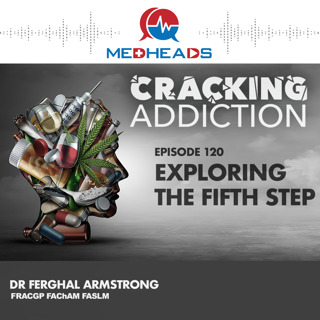
Exploring the Fifth Step: Embracing Accountability in the Fifth Step of the Twelve Step Program
In this episode of Cracking Addiction, we delve into the crucial fifth step of the twelve-step program. Join us as we explore the significance of admitting our wrongs to God, ourselves, and another human being. Here's a breakdown of the key takeaways from this insightful conversation:Admitting our wrongs to another human being takes courage: Sharing our faults with someone else can be scary, as we fear their judgment and acceptance. However, it is essential for healing and growth.Accountability and introspection: The fifth step requires us to take accountability for our actions, acknowledging our wrongs and guilts. It involves recognizing cognitive distortions and working through defences like rationalization and blaming others.Balancing self-compassion and growth: While The Fifth Step may seem like a process of self-loathing, it is important to maintain a balanced view. Recognizing our positive qualities helps us build self-esteem and fosters the process of forgiveness and redemption.
29 Nov 202321min
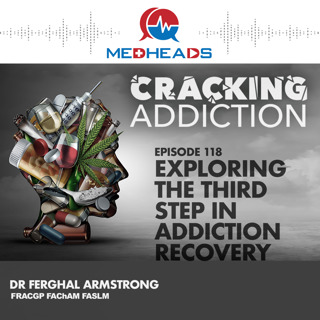
Reflecting on the Fourth Step: Exploring the Importance of the Moral Inventory in Recovery
In this episode, Dr. Ferghal Armstrong and Dr. Laura Petracek explore the fourth step of the twelve-step program - making a searching and fearless moral inventory. They discuss why this step is crucial for individuals with alcohol or substance use disorders, and how it can lead to a sense of relief and freedom from self-loathing. The conversation also covers the fifth step, where confession to a sponsor plays a significant role in the recovery journey. If you're looking for insights and guidance on how to navigate these steps and overcome addiction, this episode is for you.Key Points and Learning Outcomes:1. The Importance of a Moral Inventory: The fourth step involves taking an honest and fearless inventory of oneself, examining the wreckage caused by addiction in areas such as relationships, jobs, and personal well-being. By facing the consequences of their actions, individuals can gain a clearer perspective on the impact of their addiction.2. Relief and Support: Engaging in a moral inventory often brings a sense of relief as individuals unload the weight of negativity and self-loathing. Knowing that others have experienced similar challenges and mistakes through the support of sponsors and recovery groups can provide comfort and foster a sense of belonging.3. Fearlessness Through Willingness: While the idea of a moral inventory may initially evoke fear, the first step towards it is willingness. By acknowledging and embracing the need for self-reflection and growth, individuals can gradually become more fearless in their journey towards recovery.4. Resentments as Fuel for Addiction: Resentments are identified as the number one offender and a driving factor behind relapse. The constant replaying of negative thoughts and emotions can lead individuals to seek solace in addictive behaviours. Addressing and processing resentments is crucial for long-term sobriety.5. Aligning with Moral Values: Addiction often leads individuals to act against their own moral values, such as honesty, fidelity, or generosity. Through the fourth step, individuals reintroduce themselves to their moral anchors, reestablishing their values as a guidepost for recovery.Actionable Takeaways:1. Embrace the fear: Recognize that starting a moral inventory may be frightening but understand that it is a necessary and brave step towards recovery. Allow willingness to pave the way for fearlessness.2. Seek support: Engage with a sponsor or join a four-step group to create a sense of community and combat feelings of isolation. Hearing others' experiences and realizing you're not alone can foster a compassionate perspective towards oneself.3. Address resentments: Identify resentments and work on processing and releasing them. Understand that holding onto resentments only perpetuates the cycle of addiction, and forgiveness and acceptance can pave the way towards healing.4. Realign with core values: Take time to reflect on one's moral values and assess where addiction has led to their violation. Make a commitment to realign actions and choices with those core values, fostering personal growth and integrity.Quote:"Resentments are the number one offender and the number one reason that people go back out and relapse." - Dr. Laura Petracek
22 Nov 202319min

Surrendering to the Unknown: Exploring the Third Step in Addiction Recovery
Welcome to another episode of Cracking Addiction, where we delve into the world of addiction and recovery. In this episode, Dr. Ferghal Armstrong and guest Dr. Laura Petracek explore the third step in the twelve-step process. They discuss the concept of turning our will and our lives over to a higher power, exploring different interpretations of what that higher power may be. Dr. Petracek shares her insights on the challenges of surrendering oneself to the unknown and the importance of accountability in the recovery process. They also discuss the Serenity Prayer and its role in understanding the third step. If you're interested in addiction recovery and understanding the power of surrender, this episode is a must-listen.Key Points and Learning Outcomes:1. Understanding the Concept of Higher Power: The third step involves making a conscious decision to turn our will and our lives over to the care of a higher power as we understand it. This concept varies for each individual, and it can include religious beliefs, nature, support groups, or even a sponsor. By exploring different interpretations, we can personalize our recovery journey and find a source of accountability and support.2. Accountability and the Need for Human Connection: Surrendering to a higher power alone may not provide enough accountability in recovery. Dr. Petracek highlights the importance of involving real people, such as sponsors or support groups, in our commitment to abstain from addictive substances. This external accountability helps to overcome denial and provides a stronger foundation for long-term recovery.3. Surrendering Self-Control and Willpower: The idea of surrendering our self-control, willpower, and identity can be daunting for many individuals. Particularly for those who have relied on drugs or alcohol as a coping mechanism, letting go of familiar habits may feel like stepping into the unknown. However, surrendering the things we cannot change is a crucial step towards personal growth and finding serenity in recovery.4. Addressing Doubts and Skepticism: Some individuals may find difficulty with the third step due to its traditional association with a white Christian God. To overcome this barrier, reframing the concept of a higher power is vital. Books such as "Twelve Steps a Woman's Way" or using therapy approaches like dialectical behavior therapy can help individuals find a more inclusive interpretation that aligns with their personal beliefs and culture.Actionable Takeaways:1. Explore Your Understanding of Higher Power: Take time to reflect on your own understanding of a higher power. Consider what brings you a sense of peace, support, and guidance. It doesn't have to conform to traditional notions; it should be a source of strength that resonates with you.2. Seek Accountability in Human Connections: Find someone you trust, such as a sponsor or a support group, to hold you accountable in your recovery journey. Sharing your commitments and struggles with others can significantly enhance your chances of maintaining sobriety.3. Embrace Surrender and Letting Go: Recognize the limitations of your control over certain aspects of life. Embrace the idea of surrendering the things you cannot change and focusing your energy on the areas where you can make a difference.4. Challenge Traditional Notions: If you struggle with the concept of a higher power due to cultural or religious differences, explore alternative perspectives and resources that align with your beliefs. Look for books, communities, or therapists who can help you reframe the concept to make it more inclusive and meaningful for you.Quote:"It's like you're asking them to go off a cliff without a parachute. It's very scary. But not drinking or drugging is scary because you don't know what's going to happen. But if I wake up and have a beer, I know exactly what's going to happen and it's not...
15 Nov 202315min
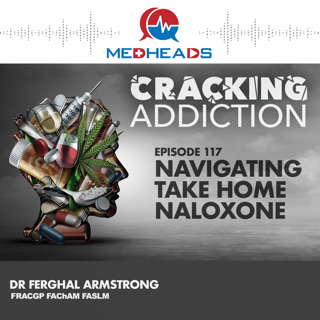
Navigating Take Home Naloxone: An Antidote for Opioid Toxicity
Dr. Ferghal Armstrong discusses the importance and impact of take-home naloxone with experts Jeremy Szmerling and Dr. Suzanne Neilsen. They explain what take-home naloxone is and its role as an opioid antagonist in combating opioid toxicity, including both heroin and prescription opioid overdoses. They debunk common misconceptions and address barriers to its usage. The episode provides valuable insights for clinicians and highlights the need for wider availability and education around take-home naloxone.Learning Outcomes:1. Understand the purpose and availability of take-home naloxone: Take-home naloxone is an opioid antagonist that can be self-administered by a patient using formulations available at pharmacies. It is classified as a pharmacist-only medication and can be dispensed without a prescription.2. Recognize the importance of take-home naloxone in combating opioid toxicity: Opioid toxicity can lead to serious side effects, including sedation, constipation, nausea, and even respiratory failure and death. Take-home naloxone acts as an antidote to reverse opioid overdoses, making it crucial in saving lives.3. Dispelling myths and addressing stigma: Despite prevalent misconceptions, studies have shown that providing naloxone does not promote riskier behaviour or increase opioid use. It actually reduces the risks associated with opioid use. It is important for healthcare providers to offer naloxone without stigma to anyone at risk of an opioid overdose.Actionable Takeaways:1. Healthcare providers should be aware of the availability of take-home naloxone and its importance in preventing opioid overdoses. They should be prepared to offer and educate patients at risk, regardless of whether they use illicit or prescribed opioids.2. Language and approach matter: When discussing naloxone with patients, it is crucial to use appropriate language and consider the individual's background and context. Starting with terms like "overdose" or "opioid toxicity" can vary based on the patient's familiarity and comfort level.3. Overcoming barriers: Clinicians should feel confident in identifying individuals who would benefit from naloxone training and delivery. Offering naloxone to a broad population, rather than selectively targeting high-risk individuals, can lead to more lives being saved.Quote: "Giving naloxone reduces the risks that people take... providing naloxone, providing education about what an overdose is and how to reverse it, is only going to help someone reduce their risk." - Dr. Suzanne Neilsen
8 Nov 202324min
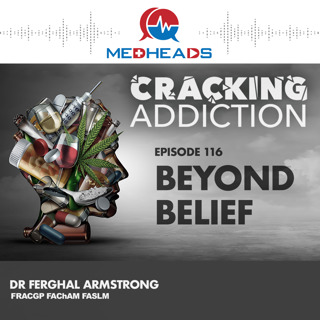
Beyond Belief: Discovering the Power that Restores Sanity in Addiction Recovery
Welcome to "Cracking Addiction." In this episode, Dr. Fergal Armstrong and Dr. Laura Petracek dive into the second step of the twelve-step program: "Came to believe that a power greater than ourselves can restore us to sanity." They explore the meaning of each element of this step and provide valuable insights on attending meetings, belief in a higher power, and the restoration of sanity in recovery. Join them as they discuss the importance of accountability and the misconception of just stopping drinking without addressing the necessary changes for lasting recovery.Learning Outcomes:1. Understand the concept of "came to believe" in the context of recovery, which includes attending meetings, waking up to the need for change, and developing a belief in a power greater than oneself.2. Explore the idea of a higher power beyond traditional religious connotations, emphasizing the importance of accountability and support from others in the recovery journey.3. Recognize the limitations of simply abstaining from alcohol without engaging in the complete process of personal growth and transformation.4. Reframe the notion of "restoration of sanity" to focus on soundness of mind and personal well-being, rather than perpetuating stigma around mental health issues.Actionable Takeaways:1. Engage actively in your recovery journey by attending meetings and actively participating in the process, rather than just showing up without commitment.2. Embrace the idea of a higher power or accountability beyond yourself, whether it's through a group, sponsor, or personal belief system.3. Recognize that simply abstaining from alcohol is just the first step, and be willing to delve into the deeper aspects of personal change and growth outlined in the twelve-step program.4. Challenge the traditional understanding of sanity by reframing it as a state of soundness of mind and overall well-being, allowing for a more inclusive and compassionate perspective on mental health.Quote:"The steps don't work you, you have to work the steps." - Dr. Laura Petracek#CrackingAddiction #RecoveryJourney #HigherPower #Accountability #MentalHealthMatters #PersonalGrowth #WellBeing #Transformation #AlcoholRecovery #SoundnessOfMind
31 Okt 202320min
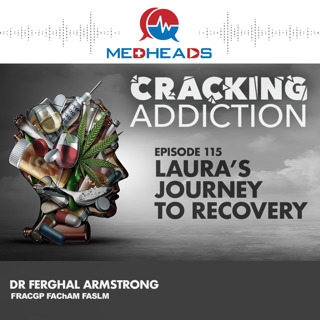
Dr. Laura Petracek's Journey to Recovery
In today's episode, we will dive deep into Dr Laura's personal journey of addiction, mental health struggles, and finding a sense of belonging. From battling with substance abuse and self-destructive behaviours to overcoming societal and religious pressures, Laura's story is a testament to the power of resilience and the importance of seeking help. We'll explore the pivotal moments that led to her recovery, the challenges she faced along the way, and the shifts in society's attitudes towards mental health and addiction. So grab your headphones and get ready for a powerful and inspiring conversation on "Cracking Addiction."In today's episode, we will dive deep into Dr Laura's personal journey of addiction, mental health struggles, and finding a sense of belonging. From battling with substance abuse and self-destructive behaviours to overcoming societal and religious pressures, Laura's story is a testament to the power of resilience and the importance of seeking help. We'll explore the pivotal moments that led to her recovery, the challenges she faced along the way, and the shifts in society's attitudes towards mental health and addiction. This episode is a must-listen if you're looking for motivation and guidance to overcome addiction. Throughout our conversation, Laura emphasizes the importance of seeking help and taking things one day at a time. Her story sheds light on the complexities of addiction and explores topics like mental illness, family dynamics, and finding a sense of belonging. By tuning in, you'll gain a deeper understanding of addiction and discover practical actions you can take to support yourself or someone you care about.So grab your headphones and get ready for a powerful and inspiring conversation on "Cracking Addiction."00:02:07]Teenage addiction, suicide attempt, recovery, treatment.00:06:22] Bullied at home and school, seek refuge.00:11:31] Struggles with identity, isolation, and belonging.00:15:52] Finished school early in rehab, struggled without it.00:16:58] Alcoholism, obsession, excessive drinking, financial consequences, sobriety.00:23:03] Bipolar disorder, fear of medication, AA support.00:29:08] Life turned better without lithium, but harder.00:30:30] Unmedicated bipolar led to depression and instability.00:36:51] Seek help for various issues; take it one step at a time.
25 Okt 202339min
